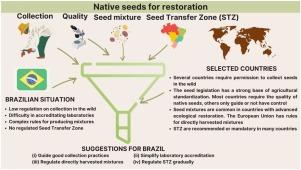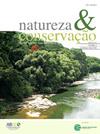How can Brazilian legislation on native seeds advance based on good practices of restoration in other countries?
IF 3.5
2区 环境科学与生态学
Q1 BIODIVERSITY CONSERVATION
引用次数: 0
Abstract
In the decade of global ecological restoration efforts, Brazil intends to restore 12 million hectares of degraded areas. This will require an ample offer of seeds of native species, unavailable on the current market, which is partly due to inadequate legislation. We reviewed the literature on native seed production and the specific legislation in Brazil, and compared with rules of other countries to identify good examples to be followed. We first verified a lack of regulation concerning the seed collection in natural environments in Brazil, which contrasts with the Society of Ecological Restoration (SER) recommendations. Best practices for seed collection should be developed by environmental agencies. Second, the scarcity of accredited laboratories for native seed quality analysis is a limitation in Brazil. The development of strategies for streamlined accreditation that align with SER's quality standards for native seeds meant for restoration purposes is an important step. Furthermore, the regulation of the trade of seed mixtures in Brazil is currently restrictive and requires a revision of norms to facilitate their use, as the case in the European Union. The mixtures directly harvested from remnants are promising to promote restoration, especially of grassy ecosystems. Another aspect is the establishment of Seed Transfer Zones (STZs) to promote the use of locally adapted ecotypes and to ensure the conservation of genetic diversity in restoration. Our study indicates how examples from other countries and the SER guidelines can guide advances in Brazilian legislation and streamline the development of a seed supply chain for ecological restoration.

如何在其他国家良好恢复做法的基础上推进巴西关于本地种子的立法?
在全球生态恢复努力的十年中,巴西打算恢复 1 200 万公顷的退化地区。这就需要提供充足的本地物种种子,而目前市场上没有这些种子,部分原因是立法不完善。我们查阅了有关本土种子生产的文献和巴西的具体立法,并与其他国家的法规进行了比较,以确定可借鉴的良好范例。我们首先发现,巴西缺乏在自然环境中采集种子的相关法规,这与生态恢复协会(SER)的建议形成了鲜明对比。种子采集的最佳实践应由环境机构来制定。其次,巴西本土种子质量分析认证实验室稀缺也是一个限制因素。制定符合 SER 质量标准的简化认证战略,对用于恢复目的的本地种子进行认证,是重要的一步。此外,巴西目前对混合物种子贸易的监管具有限制性,需要像欧盟一样修订相关规范,以促进混合物种子的使用。直接从残留物中收获的混合物有望促进恢复,特别是草地生态系统的恢复。另一个方面是建立种子转移区(STZs),促进使用适应当地的生态型,确保在恢复过程中保护遗传多样性。我们的研究表明,其他国家的范例和 SER 准则可以指导巴西立法的进步,并简化生态恢复种子供应链的发展。
本文章由计算机程序翻译,如有差异,请以英文原文为准。
求助全文
约1分钟内获得全文
求助全文
来源期刊

Perspectives in Ecology and Conservation
Environmental Science-Nature and Landscape Conservation
CiteScore
7.80
自引率
4.30%
发文量
46
审稿时长
59 days
期刊介绍:
Perspectives in Ecology and Conservation (PECON) is a scientific journal devoted to improving theoretical and conceptual aspects of conservation science. It has the main purpose of communicating new research and advances to different actors of society, including researchers, conservationists, practitioners, and policymakers. Perspectives in Ecology and Conservation publishes original papers on biodiversity conservation and restoration, on the main drivers affecting native ecosystems, and on nature’s benefits to people and human wellbeing. This scope includes studies on biodiversity patterns, the effects of habitat loss, fragmentation, biological invasion and climate change on biodiversity, conservation genetics, spatial conservation planning, ecosystem management, ecosystem services, sustainability and resilience of socio-ecological systems, conservation policy, among others.
 求助内容:
求助内容: 应助结果提醒方式:
应助结果提醒方式:


